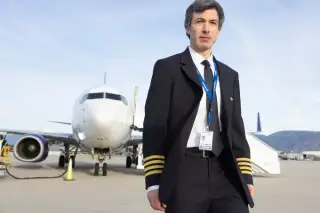SPOILER ALERT: The following piece contains spoilers from “My Controls,” the Season 2 finale of “The Rehearsal.”
In the intricate world of Nathan Fielder's creations, “The Rehearsal” stands apart. Unlike his previous works, this series delves explicitly into the labyrinth of his own psyche. While "Nathan for You" humorously claimed to aid small businesses, its true essence lay in its absurdity. “The Rehearsal,” on the other hand, began with a semblance of altruism—helping volunteers navigate personal relationships through meticulous preparation. Yet, as Season 1 unfolded, Fielder’s character evolved from aiding others to grappling with his own struggles, hinting at the elaborate ruse that would define Season 2.
Ostensibly, the second season presents Fielder’s earnest endeavor to enhance communication among airline pilots, aiming to prevent catastrophic crashes. This mission, however, spiraled into an intricate web of singing competitions, cloned dogs, and even a surreal scene of a bald-capped Fielder breastfeeding from a giant puppet. Yet, the finale revealed a hidden truth: throughout the episodes, Fielder had been secretly learning to fly planes, culminating in obtaining a commercial pilot's license. Thus, he wasn’t merely assisting pilots; he was one himself, seeking solace and validation through their challenges.
In the preceding episode, Fielder subtly shifted focus to his personal journey, resonating deeply with autistic fans who identified with his perpetual awkwardness. These connections were not just casual observations but a profound exploration of his chronic inability to connect easily with others—a defining trait of his on-screen persona. By addressing these themes, the show provided a poignant backdrop to Season 2, explaining Fielder's fixation on the dynamics between captains and first officers.
This project not only expanded comedic boundaries but also elevated Fielder’s commitment to new extremes. His unique incompetence in landing planes became a source of dark humor, while his audacious plan to co-pilot a jet under regulatory loopholes married his scheming nature with HBO's resources. The sight of Fielder commanding the cockpit at cruising altitude was nothing short of breathtaking, challenging the limits of television's impact.
Yet, beneath the comedy lies a deeper narrative. Fielder's concerns about potential autism intersected with his aviation ambitions when completing an FAA disclosure form. Seeking clarity, he pursued a formal diagnosis, including an fMRI, amidst Reddit’s unsolicited advice. As results delayed, Fielder embarked on a solitary flight, receiving an ominous voicemail mid-journey. In a quietly delivered yet profoundly impactful coda, Fielder disclosed his method of coping with insecurities—shutting empty jets across remote global locations. Over aerial views of the African desert, his voiceover echoed: “If you’re here, you must be fine.”
These closing lines resonate powerfully despite the season's deliberately meandering structure. Initially framed as an altruistic mission, Season 2 ultimately reveals itself as deeply personal. It hints at the lingering shadows of Season 1, where experiments like simulated parenthood left indelible marks on Fielder. Perhaps driven by dissatisfaction with external analyses of his dysfunction, Fielder escalates his acts of one-upmanship, questioning whether an irredeemable loner could achieve such feats.
In the finale, Fielder finds reassurance in discovering that rehearsal is integral to pilots' training. He isn't alone in his reliance on obsessive practice; many share his belief in its transformative power. Ultimately, success overshadows methodology. When Fielder successfully lands the plane, he is greeted by a cheering crowd of collaborators. Reflecting on this moment, he narrates: “All this applause made me feel like I had done something important.” Despite his inner turmoil, the outcome validates his efforts: “As long as you get everyone down safely, that’s all it takes to be a hero.”
By concealing his true intentions until the final moments, Fielder crafts a less cohesive but more intriguing second season. This approach mirrors the magic tricks that fascinated him since youth, blending form and function seamlessly. Concealing his true motives aligns with his conclusion that emotional transparency isn’t always necessary. If the landing is perfect, no one questions the journey.




